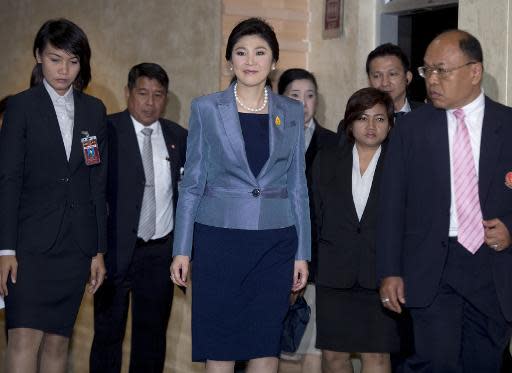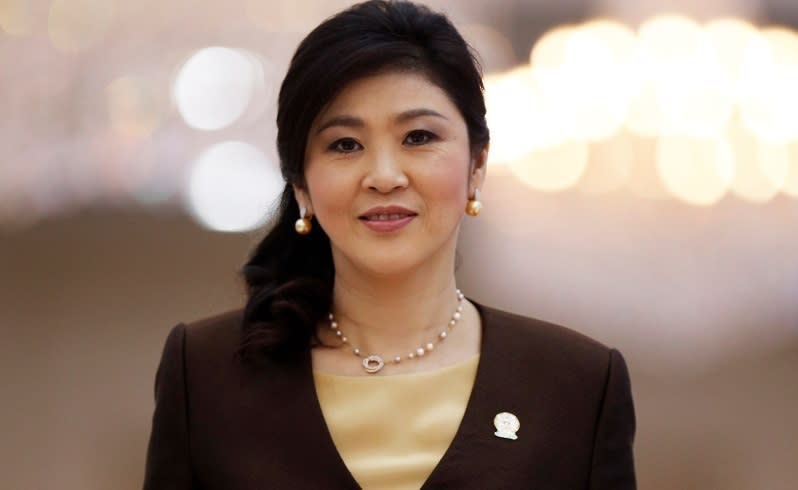Thai court orders PM Yingluck Shinawatra to step down
Bangkok (AFP) - Thailand's Constitutional Court Wednesday dismissed Prime Minister Yingluck Shinawatra and nine ministers for abuse of power, leaving the government clinging to power but the nation still locked in a political crisis.
The cabinet swiftly appointed a deputy premier -- Niwattumrong Boonsongpaisan -- to be Yingluck's replacement as the ruling party struggled to regain its footing after the judicial blow.
The court, which has played a key role in deposing two other Shinawatra-linked governments in recent turbulent years, ruled unanimously that Yingluck acted illegally by transferring a top security official in 2011.
"Therefore her prime minister status has ended... Yingluck can no longer stay in her position acting as caretaker prime minister," presiding judge Charoon Intachan said in a televised ruling.
Nine cabinet ministers who endorsed the decision to transfer Thawil Pliensri were also stripped of their status.
But fears that the court would dismiss the entire cabinet proved unfounded.
Niwattumrong, a Thaksin-loyalist who is also commerce minister, was quickly promoted to the role of caretaker premier.
He vowed to press ahead with a planned July 20 election to establish a new government. That poll date has yet to be endorsed by a royal decree.
Observers said the court ruling does nothing to ease Thailand's prolonged political malaise.
- Trouble ahead? -
Anti-government protesters are still on Bangkok's streets and the promotion of a Thaksin supporter may make Yingluck's dismissal a hollow victory.
"Red Shirt" supporters of the government meanwhile threaten to rally to defend it and to press for elections, raising fears of clashes. They will mass on Saturday in a Bangkok suburb.
"This is a war of legal attrition," said Paul Chambers of the Institute of South East Asian Affairs at Chiang Mai University.
"And the arch-royalists (anti-government forces) are winning it. They are cutting away at the Puea Thai government slice by slice, hoping to exhaust it into submission," he said predicting fresh legal cases against the new premier.
The kingdom has been bitterly split since 2006 when an army coup deposed former telecoms magnate Thaksin as prime minister.
He now lives overseas to avoid jail for corruption convictions, but is accused of running the country by proxy through his sister.
Thaksin is reviled by the Bangkok elite, middle class and royalist southerners who say he has sponsored nepotism and widespread corruption and who see him as a threat to the monarchy.
But he is loved in the poorer north and northeastern regions and among the urban working class for recognising their burgeoning political and economic aspirations.
- Fighting back tears -
They have returned Shinawatra-led or linked governments to power in every election since 2001.
In a defiant press conference Yingluck reiterated her innocence of the abuse of power accusation.
"I am proud of every minute I have worked as prime minister because I came from a democratic election," she said, at times fighting back tears.
In the six months since the latest street protests erupted, 25 people have been killed and hundreds wounded in gun and grenade attacks, kindling fears of wider clashes.
A general election called by Yingluck in February to shore up her besieged government was disrupted by protesters and boycotted by the main opposition party.
It was later annulled by the Constitutional Court, enraging Red Shirts who said the judges effectively stole their vote.
Anti-government demonstrators are likely to reject the latest poll date. They want an appointed premier to enact loosely-defined "reforms" to curb the influence of the Shinawatras before any new election.
The ruling party has accused the constitutional court of railroading Yingluck's case through because it is biased against the Shinawatras.
The court oversees cases of violations of Thailand's charter, which was rewritten after Thaksin's removal.
In 2008 it forced two Thaksin-allied prime ministers from office.
Yingluck will also find out over the coming days if she will be indicted by anti-graft officials for neglect of duty in connection with a costly rice subsidy scheme.
An unfavourable ruling could see her banned from politics for five years.
With both sides convinced they can prevail, the ongoing battle for "Thailand's soul" looks set to drag on, said Thitinan Pongsudhirak, director of the Institute of Security and International Studies at Bangkok's Chulalongkorn University.
"Somehow both sides have to think that they cannot win it all -- that?s when we will see some compromise... but right now we are likely to see things get much worse before things get better."




